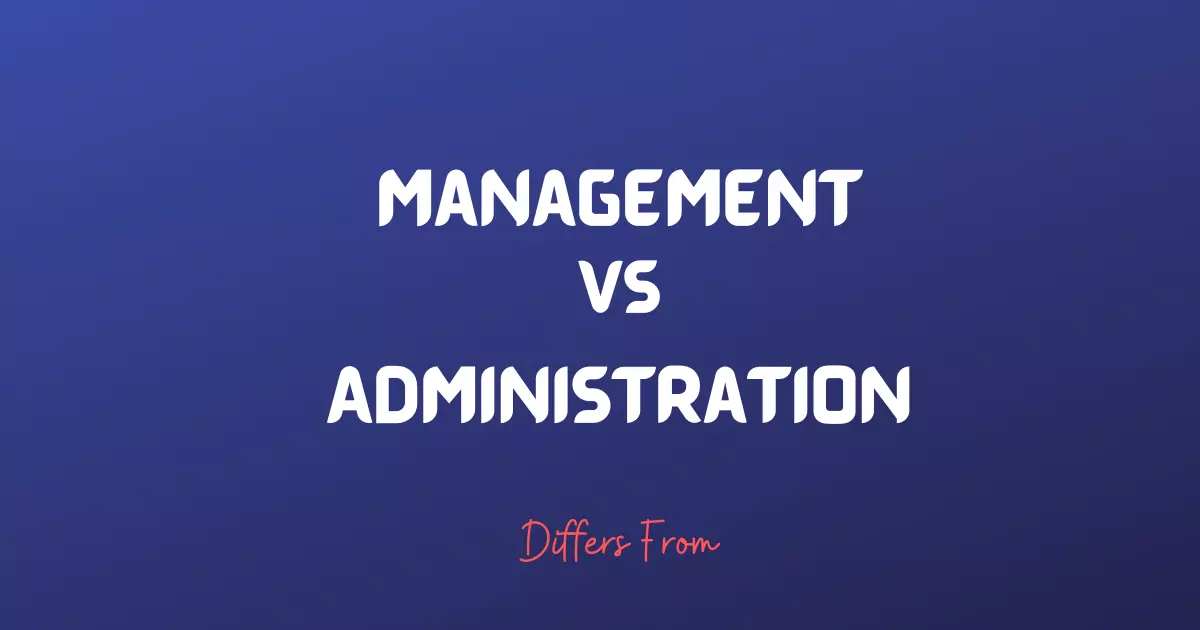Administration and management are both important functions in every organization. There is no organization without management, and there is no management without administration. These two are mutually beneficial. Let’s look at some of the fundamental difference between management and administration. Management is the act of managing people and their work in order to achieve an organization’s purpose by utilizing its resources, whereas administration is an organized process of managing an organization’s management.
Management
Management is the way an organization is run, whether it’s a business, a non-profit, or the government. Managing a business’s resources is both an art and a science. Management usually means putting people, money, technology, and natural resources to use and figuring out how to use them.
Administration
Business organizations are administered by managing their functions, jobs, policies, and general management processes in a systematic manner. Administrators are those with further education, such as a high school diploma or college degree, and government office experience. They comprehend the public administration principles and how they apply to both for-profit and non-profit enterprises. The primary objective and role of administration is to produce plans, policies, and procedures for state governments, enterprises, organizations, and non-governmental organizations (NGOs) to facilitate the formation of goals and objectives, the enforcement of regulations, etc.
Difference between Management and Administration:
| Management | Administration |
| Management is a systematic way of managing people and things within the organization. | The administration is defined as an act of administering the whole organization by a group of people. |
| Management is an activity of business and functional level. | Administration is a high-level activity. |
| Middle and Lower Level | Top level |
| Profit-making organizations, i.e., business organizations. | Government offices, military, clubs, business enterprises, hospitals, religious and educational organizations. |
| Putting plans and policies into action. | Formulation of plans, framing policies, and setting objectives |
| Employees, who work for remuneration | Owners, who get a return on the capital invested by them. |
| Executive and Governing | Legislative and Determinative |
| Managing work | Making the best possible allocation of limited resources. |
Management and Administration:
Management:
- Management entails conceptualizing, starting, and bringing together the many parts of coordinating, activating, and integrating the diverse organizational components while sustaining the organization’s existence in pursuit of predetermined objectives.
- Business management is the process of arranging and managing a business’s resources, such as personnel, income, etc.
- The focus of business management is the supervision of both individual personnel and huge initiatives.
- The managers’ values, attitudes, beliefs, and decisions impact management decisions.
- Management consists of the organization’s personnel who are compensated (in the form of salaries & wages).
Administration:
-
“Administration entails a comprehensive decision of policies, the definition of major objectives, the elucidation of general aims, and the formulation of wide programs and initiatives.”
-
Business administration is the study of operations and leadership in the context of business.
-
Corporate administration is mostly concerned with business strategy and operations.
Public opinion, government policies, religious organizations, customs, etc. have an impact on the administration. -
Administration represents firm owners who receive a return on their invested money and profits in the form of a dividend.
Business Management vs. Business Administration
When pursuing different concentrations in business, it’s easy to come across degrees and wonder what the difference between them is. In particular, business administration and business management sound similar but have core differences in curriculum and career outcomes.
- Contrasting and comparing
- Common careers
- Important skills
- Education
Business Management:
Business management is the planning-based process of managing all aspects of agricultural operation. Business management is the process of arranging and managing a company’s resources, such as its personnel, income, and information. Management of a business focuses on monitoring both individual personnel and huge initiatives. A degree in business management places greater emphasis on leadership and management tactics.
The coordination and organization of business activities constitute business management. Managers monitor operations and assist employees in achieving maximum productivity. A business manager may also supervise or train new personnel in order to assist an organization in achieving its operational and financial goals.
Career paths in business management
1. Marketing manager
Marketing managers evaluate the demand for a company’s and its competitors’ products and services. They explore potential markets for the organization’s products and supervise the development of profit-maximizing strategies by a team.
2. Sales manager
Sales managers are responsible for determining the strategy underlying sales activities and objectives. They answer customer complaints, develop budgets, analyze sales figures, and track client preferences to determine the emphasis of sales efforts.
3. Business analyst
Business analysts spend their days acquiring information regarding company-wide issues or practices. They next examine the acquired data to determine potential remedies or modifications.
4. Financial analyst
Financial analysts undertake qualitative analysis of the finances and investments of an organization. They create charts, graphs, and spreadsheets while analyzing financial data to forecast corporate, industry, and economic circumstances.
5. Account Manager
Account managers serve as the company’s representatives with clients. They cultivate client relationships, collaborate with sales and marketing departments to acquire new clients, create presentations and sales pitches, and communicate client agendas to the rest of the organization.
Business Administration:
Professionals in business administration work to make sure that businesses and organizations are run well, efficiently, and make money. Before thinking about getting a business degree, people should know what business administration and management are. In smaller groups, the roles may not be very different from one another. But, even though business administration and management are often lumped together, they are each different in their own ways.
Business administrators are in charge of making sure that the day-to-day operations of a company run smoothly. Students who get a degree in business administration learn how to make good predictions, plan and research strategically, and start their own businesses. These skills are important for success in a fast-paced business world, and they give graduates the chance to make important, long-term decisions for their companies.
Career paths in business Administration
1. Sales Manager:
A sales manager is in charge of a company’s sales team and ultimately brings in money for the company. Setting sales goals, analyzing sales data, and making sales training programs for the sales representatives are usually part of the job.
2. Business Consultant:
Business consultants also called “management consultants,” help businesses develop ways to make their businesses run better. They tell managers how to make a business more profitable by cutting costs and bringing in more money.
3. Analyst of Market Research:
A market research analyst helps a business determine who its customers are, what products it should sell, and how to market those products well. Market research analysts often come up with the questions for surveys and train and oversee the people who answer the questions. Then, they look at the research and tell management what they found.
4. Loan Agent:
Loan officers look over loan applications from people and businesses and decide whether or not to approve them.
5. Specialist in Human Resources:
Human resources specialists’ main job is finding, screening, interviewing, and hiring new employees. However, most HR specialists are trained in all HR tasks, so they often handle other HR tasks like employee relations, compensation, and benefits.
Difference between Business Management and Business Administration
Here are a few ways to look at how the two fields are different:
1. Operation management vs. process management:
The main difference between Business Management and Business Administration is what you are in charge of in each job.
2. Making a big plan and focusing on one thing:
Some of the most common things that business managers have to do are plan projects and get their teams organized.
3. Work with customers vs. work inside the company:
Based on what we have talked about so far, we could say that business managers care more about how the company interacts with the rest of the business world. In contrast, business professionals who work in administration care more about how the company works on the inside.
4. Leading big or small groups:
Business people with more specialized skills tend to work in smaller teams with a high level of expertise.
Difference between management and planning
Management is the comprehensive process of reaching a objective. Planning is meant to demonstrate the expected outcome of the strategy. They are impersonal and neutral. In contrast, the management control process and its associated data are meant to influence managers to take actions that will produce the desired outcomes. Planning heavily depends on external information, or data acquired from outside the organization, such as market study, estimates of and other elements involved in constructing a plant in a new location, technical advancement, etc. Communication of objectives, policies, standards, decisions, and results throughout the business is crucial to the management control process.
Difference between managerial functions and managerial roles
The distinction between managerial and managerial roles is that managerial functions refer to a manager’s primary duties and obligations. In contrast, managerial roles refer to the actions required to carry out corporate operations.
A manager’s tasks and obligations are managerial functions. A manager’s responsibilities within an organization include planning, organizing, directing/leading, coordinating, and controlling.
Depending on the circumstances inside an organization, a manager performs various duties. A manager’s duties in every organization include planning, organizing, leading, coordinating, and overseeing. Similarly, a manager must play multiple roles when doing different tasks, including interpersonal, informative, and decision-making roles. However, the primary distinction between role and function is that role refers to a person’s participation in a particular scenario. In contrast, function refers to a person’s obligation or the inherent purpose of anything.

